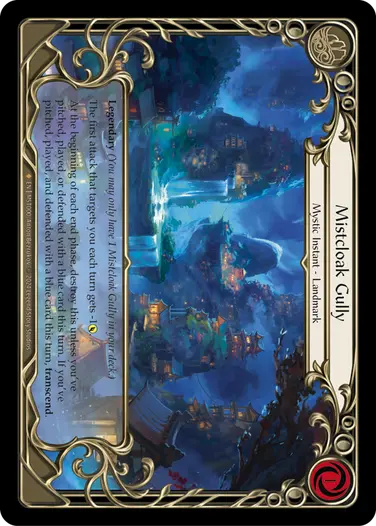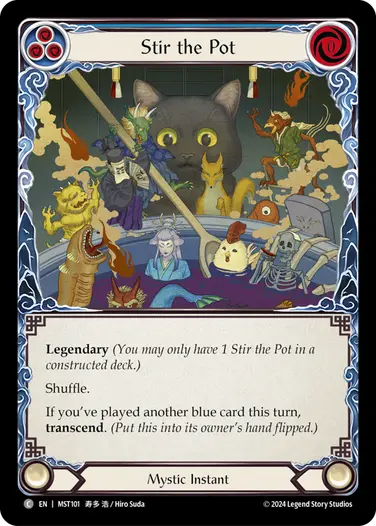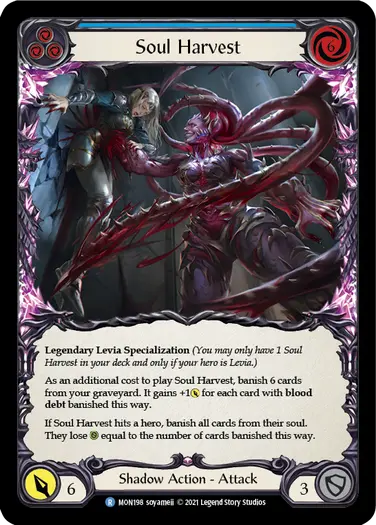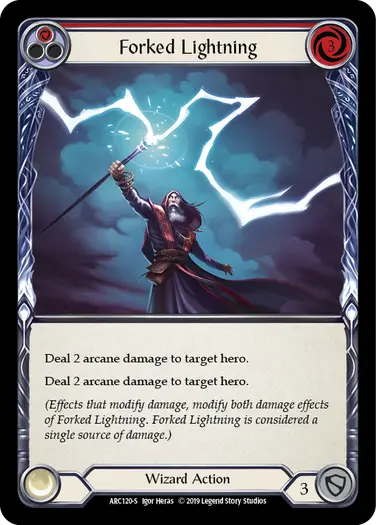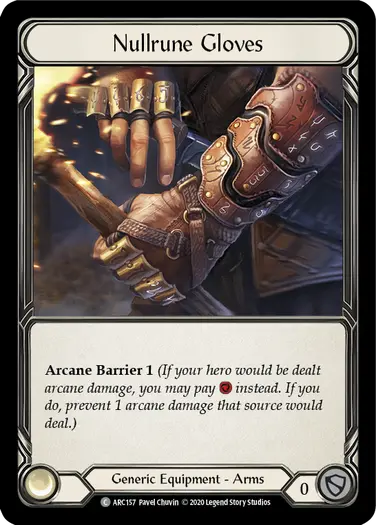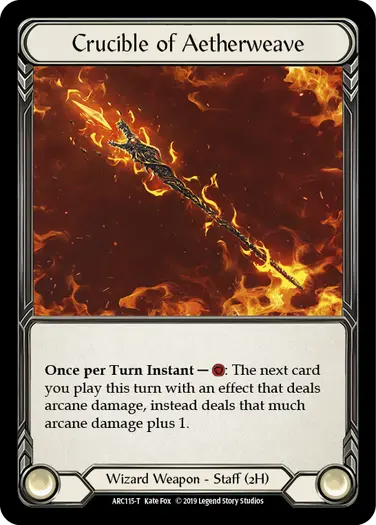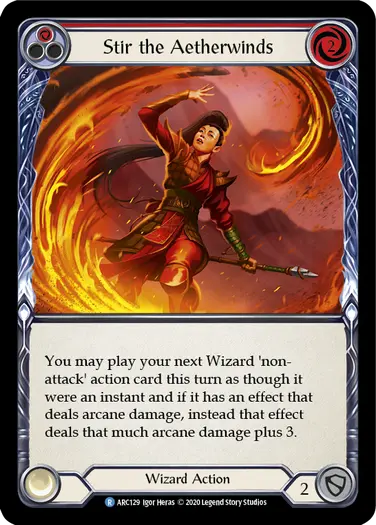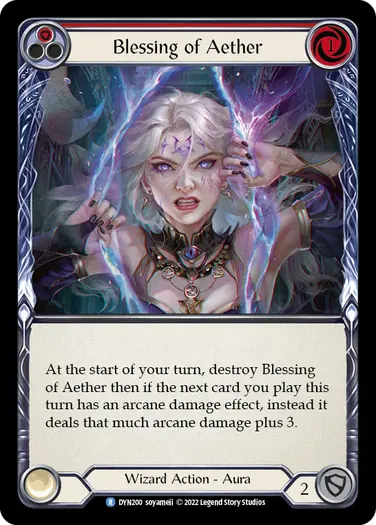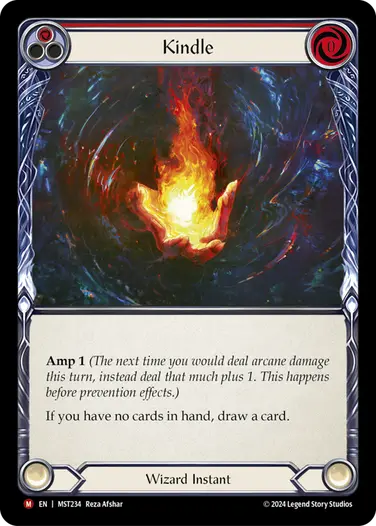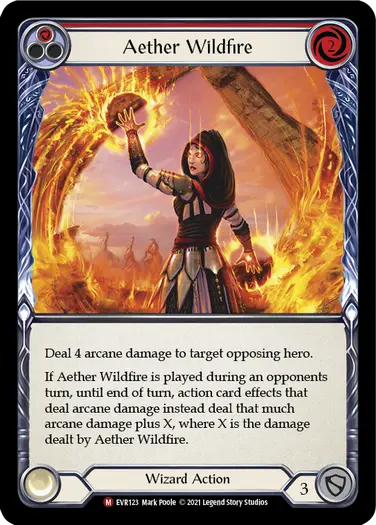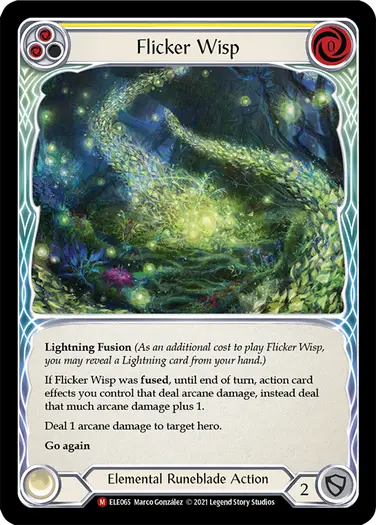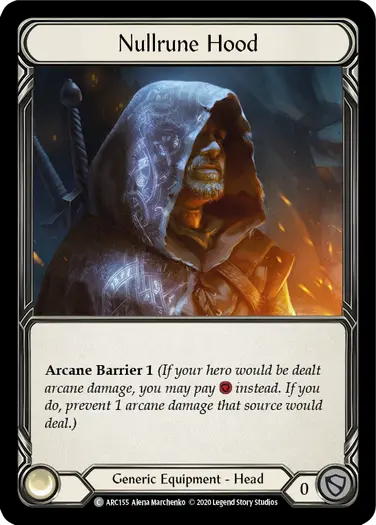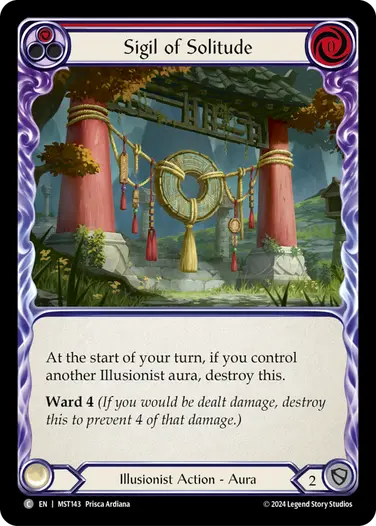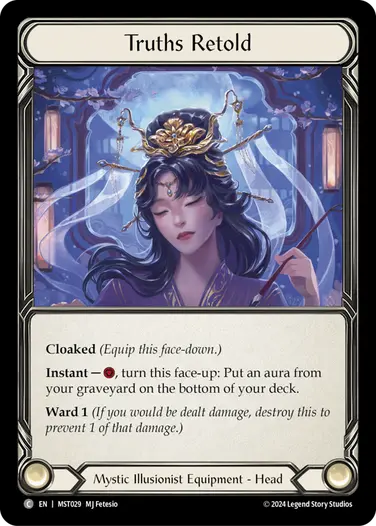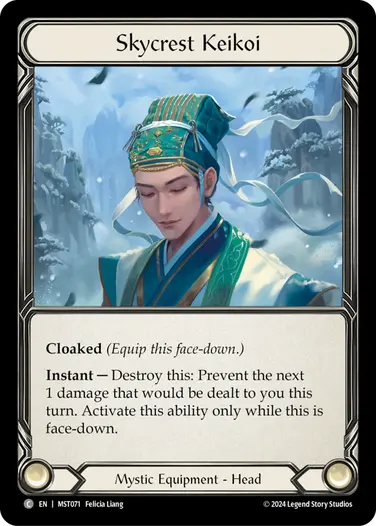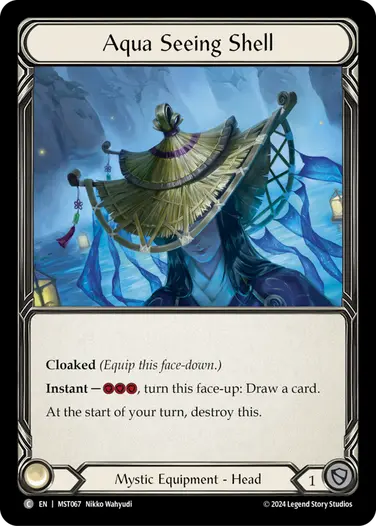With Part the Mistveil right around the corner, we’ve introduced some updates to our Rules and Policy that we believe will have a positive impact on gameplay and tournament experience. Let’s dive in…

Legendary keyword only applies to constructed
The functionality of the legendary keyword has been updated to the following:
- You can’t run more than one of this in a constructed format.
This change retroactively affects some existing limited formats, Monarch in particular, but we believe that this change is negligible in comparison to the benefit to players’ limited experience. Part the Mistveil limited could not work as intended if players could not run more than 1 of each of the legendary transcend-cards, and this change also opens up many other opportunities to explore in limited play without being burdened by players opening up cards they can’t play.
Note that Mistcloak Gully purposefully has the old reminder text, as it it cannot be run in limited games (it has fabled-rarity and appears in the back two cards of the pack), and using the old reminder text reduces the word count on the card-face.
Forked Lightning
I promised myself that I wouldn’t have to deal with this card again… but here we are…
Forked Lightning is a unique card because it was designed early on in Flesh and Blood with two specific goals in mind:
- If you buff it, it should double the buff.
- Arcane barrier only applies once.
The second goal in particular was to give Kano the ability to burst through arcane barrier in blue-heavy constructed decks, such as Guardian. However, the rules had to be bent, specifically for Forked Lightning, to justify why dealing damage this way is special, and why buffs apply to each effect of damage but prevention did not.
After much discussion, we have decided that Forked Lightning no longer needs to serve its original purpose. The interaction of only being able to apply arcane barrier once is unintuitive and confusing (especially for newer players) and limits the design space that we may explore in the future. As such, we believe that this is a good opportunity to readdress how Forked Lightning and other arcane damage effects operate regarding buffs and prevention.
From the publication of the next version of the Comprehensive Rules (2.8.0.) with the release date of Part the Mistveil, this is how arcane effects will operate:
Card-based buffs
Effects that apply to a card and increase its arcane damage will apply to ALL arcane damage events of that card. Regarding Forked Lightning, this means both events of dealing 2 arcane damage will be affected by a card-based buff.
Event-based buffs
Effects that apply to events of arcane damage only apply to events and not the whole card itself. Regarding Forked Lightning, this means an effect that ONLY buffs 1 event (e.g. Amp 1), it will only buff one of the two arcane damage events (e.g. deal 3 and then 2 arcane damage). Effects that apply to ALL events of damage (e.g. Aether Wildfire) would still apply to both effects of Forked Lightning.
Prevention effects
Prevention effects operate on events of damage, not on cards/layers, as they can only be applied once per event. The primary change for Forked Lightning is to acknowledge that it creates two events of deal 2 arcane damage. The change means that arcane barrier (and similar prevention effects) can now apply to each of these arcane damage events. Here are two examples of where this change matters:
Nic controls a Nullrune Hood. Tyler plays and resolves Forked Lightning, generating two events of deal 2 arcane damage against Nic. Nic applies arcane barrier 1 on the first event of damage, and only takes 1 arcane damage. Then, Nic applies arcane barrier 1 on the second event of damage, and only takes 1 arcane damage again. In summary, Nic prevented 2 total damage with arcane barrier 1 and took 2 total damage.
Nic controls two Sigil of Solitude (red). Tyler plays and resolves Forked Lightning, generating two events of deal 2 arcane damage against Nic. Ward 4 (from Sigil of Solitude) is applied to the first event of damage, destroying the Sigil and reducing the damage to 0. Then, Ward 4 (from the second Sigil of Solitude) is applied to the second event of damage, destroying the second Sigil and reducing the damage to 0. In summary, Nic prevented all the damage, but their two Sigil of Solitude (red) were destroyed in the process.
Changes to concessions and prize discussion
We are updating our policy regarding when and how players can concede and the organization of prize splitting. Before we delve into the changes, it’s important to understand one of our core motivations.
The Living Legend system is a core part of the Flesh and Blood identity – it relies on the results of Flesh and Blood games being played. If the results of these games are determined without a game being played, it compromises the integrity of what the Living Legend system stands for: Honouring the success of heroes and their players in competitive events.
The change can be summarized in three points:
- Players can no longer ask for a concession at any point
- Once players have discussed prizes, they can no longer concede
- Discussion about future turns (after time is called) is considered asking for a concession
Players can no longer ask for a concession at any point
After much internal deliberation, we do not feel that asking for a concession adds value to the play experience as a whole. Previously, the policy allowed players to ask for a concession before presenting their decks, which was in place for friends or teams to organise concessions and get through to the top cut. But what we’ve found that this policy is most often used for players to ask for a concession in return for implicit or explicit compensation.
In addition, many newer players have felt disheartened or threatened when asked for a concession by their opponent at the start of the game because there was no drawback for the opponent to ask before every match they play. As such we feel removing the right to ask for a concession both simplifies policy for the understanding of both players and judges and will lead to an overall positive benefit for the wider community.
Once players have discussed prizes, they can no longer concede
Regarding prize splitting, we understand that there are many circumstances where teams or friends agree to split prizes and share their success – or players want to redistribute prizes because they value them differently. However, many will also shortcut the process by conceding games to do so.
In the past, players have justified this by trying to separate this process into two conversations, first discussing who wants what, and then discussing who should concede to get the desired outcome. In reality, these are not separate conversations. By coming to an agreement on the distribution of prizes, it changes players’ incentives and lays out the path of concession, ultimately changing the outcome of the game.
We do not believe that removing the right to discuss prizes entirely is going to lead to a positive outcome. We do think that incentivising players to play out the game (by removing the right to concede) will help encourage players to play the game regardless of any discussion of prizes. As such we will also be investigating how players may rearrange placement-based prizes, so that concessions will not be required for a player to receive a certain prize.
We believe this policy is more reflective of the core ethos of Flesh and Blood. We acknowledge that some players in this circumstance may choose to declare no defending cards for the entirety of a game to create a non-game with the same outcome as a concession – they will not be punished for doing so. We also acknowledge that in some ways, that leaves this policy intrinsically flawed in terms of its ability to actually dictate outcomes. If there were a perfect solution here, we would happily apply it and move on.
However, Legend Story Studios has always sought to create the ideal TCG experience, and we are not content to let perfect be the enemy of better. Despite the fact that many institutions before us have allowed prize assignment and match-fixing behaviors, we would prefer a world where everyone attended tournaments to play as many great games of Flesh and Blood as possible. We will continue to try to create that world by hopefully shifting the culture around concessions, and giving players social incentives to skip the deal-making and settle outcomes in the arena.
Discussion about future turns (after time is called) is considered asking for a concession.
Finally, during a tournament, players who haven’t finished their game when time runs out are given an additional turn to be able to finish their games. Players can concede before taking an action, but once they continue playing, they can’t concede and must finish the game. This end-of-round procedure means that a player can make a choice to either concede to the opponent of their own volition or attempt to end the game by playing it out.
The reason we allow players this choice, rather than simply cut off concessions when the time runs out, is because there are many instances where a player would have liked to concede but was too engrossed in the game to notice the remaining time left to play. What we’ve seen is that some players take this opportunity to discuss the game state and conclude who should have won if the game were to continue. This discussion not only extends the time at the end of the round but gives an opportunity for players to imply that their opponent should resign because they were going to lose anyway. As such our policy has been updated to discourage this type of discussion.
In short, once time is called, players should establish if they are going to concede or continue to play without discussing future turns of the game. Players should already be aware of the current game state and be able to make an informed decision about whether they want to concede of their own volition.
Final note
We understand that this policy is not perfect, and indeed, no policy is. However, we intend to continue to challenge the status quo of prize-splitting discussion and organised concessions through policy, and we know many fans of great games support us in our efforts to do so.
Slow play
We have a renewed focus on addressing slow play in the competitive scene. This includes an update to the slow play infraction and additional education for judges when intervening in games for slow play infractions.
In short, players are expected to play at a reasonable pace, and failure to do so is considered slow play. Slow play is subjective and highly contextual – there is no set time amount to make a decision, as it is often dependent on the game state.
Slow play not only adversely affects tournament organisation and the spectators’ enjoyment of featured matches, but is also unfair to other players. The longer a player takes to make a decision, the higher the likelihood that the opponent will lose focus or concentration, which puts them at a disadvantage when the game is already very mentally taxing.
Due to the nature of how the game is played, it is unreasonable to implement measures that monitor and regulate the exact amount of time players take to make in-game actions. That being said, players should be vigilant about the time both they and their opponents are taking, and call a Judge if they cannot mutually resolve the pace of play. It is not just about the total time a player takes over the course of the game (i.e. dividing the round time in half), but the time in which each decision is made relative to the game state.
A final note about equipment
With the advent of the cloaked keyword, it has become more important than ever to present equipment properly throughout a game.
Regarding the cloaked mechanic, a new policy is being introduced where players must reveal the remaining cloaked equipment at the end of the game when asked. While we encourage players to do this of their own volition as good practice, we understand that there may be cases where one or even both players forget to reveal their equipment at the end of the game. We do not want to punish a hard-earned win with a game loss from what would be an inconsequential error in most cases, and we certainly don’t want to incentivise players to distract their opponents from revealing so they can shark a free win. However, players MUST reveal when asked by the opponent or a tournament official (judge/coverage/TO, etc) so that we verify the integrity of the game. Failure to reveal in these circumstances may be met with severe penalties.
Cloaked equipment are reliant on being face-down in the equipment zone. It was and always has been against policy to simply flip an equipment when it is destroyed, but now that policy has become even more important. As such, players and judges should be reminded that when ANY equipped card is destroyed, it should be physically moved away from its zone, into the graveyard zone. In cases where players have stored their card in a thick plastic case (e.g. snaplock or graded cases), it is acceptable for them to put it on the bottom of their graveyard or to the side of their graveyard, without violating the game-layout or note-taking policies.

Finally, the standard layout for equipment is to have the head at the top, arms and chest in the middle (with arms closer to the hero), and legs at the bottom. This layout has been carefully designed to set up expectations for communication between players, and can even be mirrored if you want to draw from the left side of the board instead of the right. Deviating from this layout makes it harder for players to comprehend at a glance, and can lead to confusion about the gamestate especially when players do not share a language. This is even more important when playing with cloaked cards, as players will make assumptions based on location of the card within the layout. Misleading your opponent by deviating from the standard layout may lead to a miscommunication infraction. Play it safe and use the standard layout every game, even if you aren’t using cloaked equipment!
